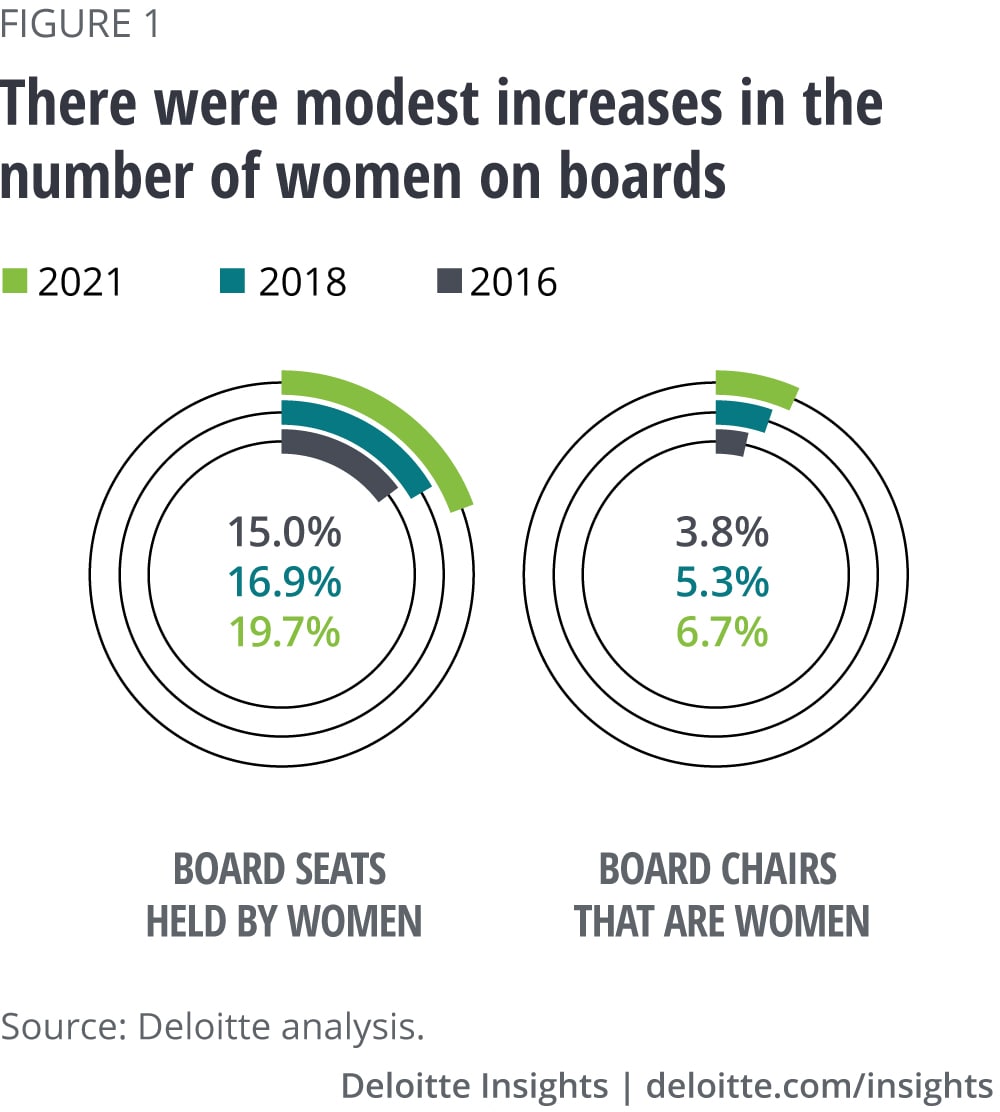Recently, the story of women in the boardroom has shifted from significant underrepresentation to a gradual yet consistent rise in numbers. While it's true that the number of women in boardrooms is gradually increasing, the full picture is more complex. As of Deloittes 2022 Women in the Boardroom report, women occupy just under 20% of board seats globally, a slight increase from previous years. However, this gradual improvement hides the significant differences that remain, especially among the top leadership positions in corporations. Women account for only 6.7% of board chairs and a mere 5% of CEO roles worldwide, underscoring a significant gap in gender diversity at the top.

Interview
These statistics set the stage for our conversation with three distinguished female board members – Connie Jordan, Paula Sorrell, and Renee Ryan. Their experiences and insights shed light on the challenges and achievements of women in the boardroom, while emphasizing the need for deliberate strategies and policies to enhance the presence of women, particularly in positions of leadership. A heartfelt thank you to Connie, Paula, and Renee for taking time from their busy schedules to share there invaluable insights. Their experiences are both enlightening and inspiring for those hoping to follow in their footsteps.
Connie Jordan
Connie (Linkedin) is a trusted strategic advisor, startup consultant, top-level networker and strategic partnership professional. As an experienced executive entrepreneurial veteran and thought leader she thrives on fostering companies to stay far ahead of trends and technology themes, expand into new markets, stand out in a way that challenges traditional marketing, inspire innovations, and develop new and successful customer-centric products and partnerships. She is an Advisory Board Member at Intellectual Property International Holdings Inc.
Paula Sorrell
Paula (Linkedin) works in the intersection of tech commercialization, entrepreneurial education, and economic development. She serves on the governing boards of the Procurement Sciences an AI company in Boston and the American Lightweight Materials Manufacturing Institute, several local economic and innovation-focused advisory boards, and the leadership committee of the State Science and Technology Institute, and is a National Science Foundation reviewer. She holds bachelor and master degrees in business from Central Michigan University, and a certified board member through Harvard Business School’s executive education.
Renee Ryan
With over 25 years of experience in investing and leading in the healthcare sector, Renee (Linkedin) is a passionate supporter of innovation and entrepreneurship that advances human health and well-being. Most recently, she was the CEO of Cala Health, a bioelectronic medicine company that develops wearable therapies for chronic diseases. She has a strong track record of finding and fuelling innovation, both as an investor and as an executive and currently sits on the board of RefleXion Medical and NeuroPace.
What challenges have you faced as a woman in the boardroom, and how have you overcome them? Could you share an example?
I believe one of the largest challenges is being heard. Being prepared, open and listening are key.
Any new person around the board table needs to get up to speed quickly. As the only woman at the table, you inherently feel an increased pressure to rapidly understand the critical issues, develop credibility, and add value quickly.
The most challenging situation often occurs when I am the only woman in the room. On a non profit board, I made a suggestion for a change to how information was presented. I got a nod or two, but then a man suggested the same thing 15 minutes later it was immediately taken as a "must do" and even when we recapped the meeting at the end, the leader thanked the man for his "fantastic idea".
How do you perceive the role of gender diversity in the boardroom, and have you noticed any shifts in gender representation throughout your career?
Diversity provides different perspectives and variety of skills and backgrounds. I believe diverse teams perform more effectively. I have noticed gradual change in the make-up of boards. There is more work to be done but the changes seem to be happening in a more organic way.
It's slightly better than it was. More than a few times I've been the only woman in the boardroom. It still happens -particularly in start-ups - but not as often. Research shows that 3 is the "magic" number for representation. I see my role as not to represent all women, but to make sure other women are considered as new board seats come available. Perhaps it's because I work in higher education, but I'm geared to think about the next generation and how they will be represented. Women bring a different perspective and there's less of a chance for "group think" when people from different backgrounds are at the table.
To me, it's not about gender diversity. Its about diversity period. It makes companies better. And I have seen a distinct shift in more women on boards and more intentional actions to support more women on boards.
How has your perspective as a woman influenced decisions in the boardroom and can you share a specific instance where it impacted a board decision or direction?
I am not sure that my influence on decisions was due to my being a woman but rather my experience, skills and knowledge.
I have been the only woman on a board when an important seat became available. The other board members came up with a list of only men to fill the seat. I challenged them to think of a qualified woman and they did, and she's been critical to the growth of the organization through her presence on the board. All I had to do was ask the question. I think it's human nature to consider those in your inner circle first, but we all know brilliant women who should be at the top of any list.
What advice would you give to women aspiring to reach the boardroom?
Network. Get to know the individuals who choose new board members. Make sure they are aware of your skills and talent and accomplishments, Voice your desire to join the board.
Listen and learn. Know that you are there for a reason: to provide your expertise and increase the value of the organization.
Know your strength. If you are a finance whiz, likely you will be sought after for Audit Committee roles. HR, Nom Gov (Nominating & Governance committee) etc. If you have a seat at the table, you have a voice...Use it.
How do you see the future for women in the boardroom, and what key initiatives or policies should organizations adopt to bolster their presence?
Grow women’s leadership in senior positions within all areas of the company. Provide equal opportunities and pay equity.
There is data showing that diverse management teams are high-performing. A couple of boards I've been on, I've noticed that it seems to be the women who are deeply engaged and do the work. For organizations that want to succeed, particularly in a competitive environment, they should seek to have a diverse board of qualified people. I do believe we'll reach a time when a board without women is the exception, not because they are required to, but because the leaders know it will improve their organization's performance.
I think the future of the boardroom must reflect what the businesses or organizations look like. "If you cannot see it, you cannot be it.”
Discover Boardshape
Our Board management software is a crucial tool for elevating your meetings. With our agenda tool, you can:
- Collaboratively set up meeting agendas.
- Allocate agenda items to your team.
- Pool together all discussion materials in one place.
- Insert live polls for immediate decisions.
- Insert comments for each item.
Our presentation mode ensures synchronization across teams and makes sure all attendees have the necessary documents at their fingertips when they need them.

